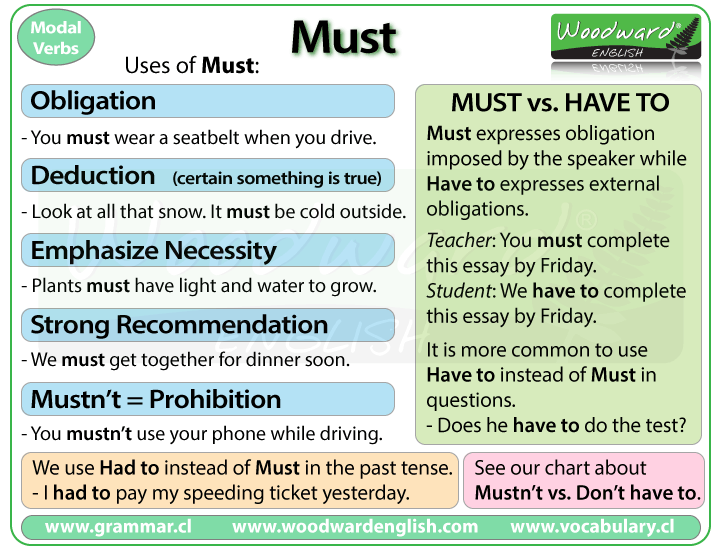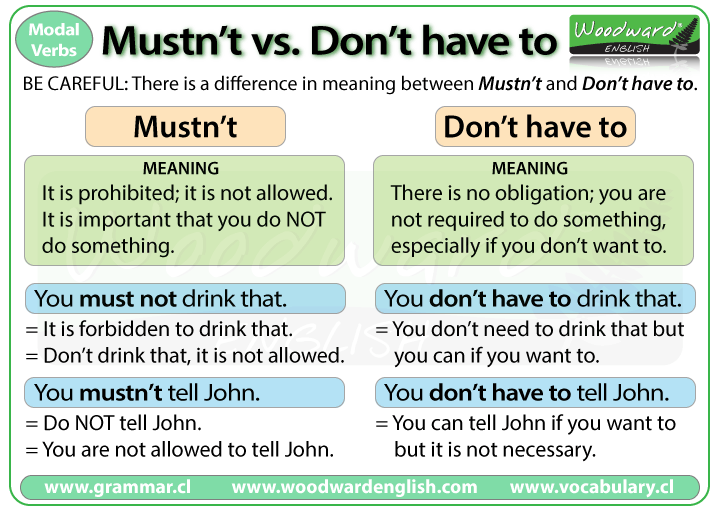Must is a modal verb
Let's look at the different uses of MUST:
MUST
1. To express obligation or duty
This also refers to laws and regulations.
- I must memorize all of these rules about modal verbs.
- People must remain seated until the show is over.
- You must wear a seatbelt at all times.
2. To emphasize the necessity of something
- Humans must have drinking water at least every two days.
- You must give up smoking, it's bad for you.
- We must have a special permit to camp in the national park.
- You must study the last two chapters before the test.
- Plants must have light and water to grow.
- You must drive carefully.
3. Deduction - Sure that something is true (Certainty)
We use this when we don't know but we are certain that it is true (based on evidence).
- Look at all of that snow. It must be really cold outside.
- The ground was wet this morning. It must have rained last night.
- Dinosaurs were very big, they must have eaten a lot.
- It's five in the morning and you still haven't gone to bed? You must be tired!
- Jack must be home. I heard a noise coming from his room.
4. Expresses positive logical assumptions (Must + have + past participle)
- That must have been my mother calling me last night, nobody else has my number.
- He must have won the lottery with the new house and car he has just bought.
- She must have been at home - her car was there.
5. A strong recommendation
Something that is highly recommended (stronger than using should)
- We really must get together for dinner sometime.
- You must see the new Peter Jackson movie, it's fantastic.
- The ice cream here is delicious. You must try some.
Must Summary Chart
Mustn't
The negative is Mustn't which refers to prohibition (negative obligation)
Mustn't = Must not
- You mustn't use your smartphone while you are driving.
- You mustn't get on the subway if you haven't paid for the ride.
- You must not open the gift until it is your birthday.
- We must not tell anyone.
Must vs. Have to
Must can be replaced by Have to with little difference in meaning:
- You have to study. (= you must study)
- He has to finish the report by Friday. (= He must finish the report by Friday)
- They have to resit the test. (= They must resit the test)
Have to is a more informal while Must is mostly used in written orders or instructions.
Also, Must expresses obligation imposed by the speaker while Have to expresses external obligation.
- Teacher: You must complete this essay by Friday
- Student: We have to complete this essay by Friday.
When we are mentioning someone else's obligations, we use Have to.
- John has to quit smoking.
For questions it is more common to use Have to instead of Must (which sounds very formal):
- When do you have to pay finish the report?
- Does he have to take a blood test?
The past tense of Must is Had to:
- I had to pay my speeding ticket yesterday.
Mustn't vs. Don't have to
Be careful with the negative of Must and Have to where they DO have a different meaning. Mustn't is a negative obligation (= it is important that you do NOT do something) while Don't have to is an absence of obligation.
Mustn't = it is prohibited; it is not allowed
Don't have to = no obligation; you are not required to do something, especially if you don't want to.
- You must not drink that. (= it is forbidden to drink that; it is not allowed)
- You don't have to drink that. (= you don't need to drink that but you can if you want)
- You mustn't tell John (= Do not tell John)
- You don't have to tell John (= you can tell John if you want to but it is not necessary)










0 Comments